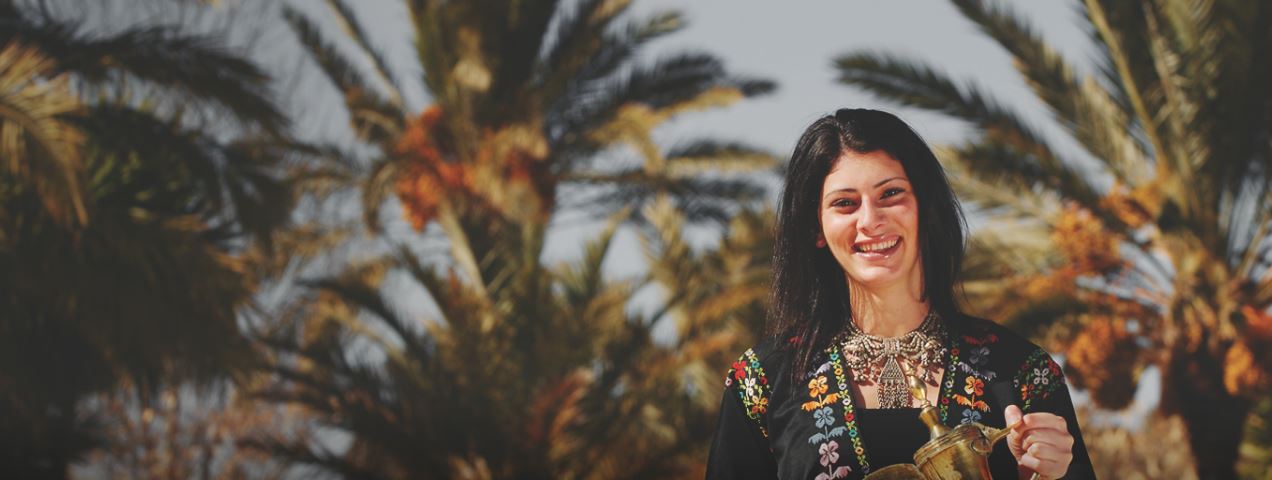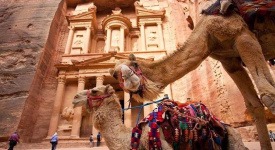People of Jordan and Jordan Culture
Before planning your tour to Jordan, you have to know the traditions and customs of your destination. Jordan can be regarded as a typically Arab country for its people are very warm, friendly and hospitable. Jordanians are typically happy to forgive foreigners who break the rules of etiquette. However, visitors seen to be making an effort to observe local customs will undoubtedly win favor.
Joining local people for a cup of tea or coffee can be a wonderful way to learn more about local culture. If you are invited yet are unable to attend, then it is perfectly acceptable to decline. Place your right hand over your heart and politely make your excuses.
Many families, particularly in rural areas, are very traditional and, if you visit their house, you may well find it is divided between the men and women. Foreign women are often treated as "honorary" men.
Local women in Jordan enjoy considerable freedom when compared with many other countries in the region. Women are entitled to a full education, they can vote, they can drive cars, and they often play significant roles in business and politics. Arranged marriages and dowries are still common.
Local Customs
Visiting Jordan? Here are a few pro-tips to help you navigate the local culture.
Pro-Tip Do’s:
- Do shake hands when meeting people; conservative veiled women may not extend their hand to men and instead will place their hand over their heart in greeting.
- Do stand up when greeting others.
- Do shake your cup from side to side in order to decline a refill of your coffee.
- Do hold your cup out to signal you would like more.
- Do accept when Arabic coffee is offered to you by your host, as it is a sign of hospitality.
- Do carry plenty of loose change with you, as many Jordanians usually do not carry adequate change.
- Do tip waiters approximately 10% gratuity in addition to the bill (unless a service charge is included in the total bill).
- Do round your taxi fare up to the nearest tenth when paying your driver.
- Do haggle with merchants when shopping.
- Do dress conservatively when exploring public areas of Jordan.
- Do be aware that Arabs tend to stand a fraction of the distance closer when conversing than people do in the West.
- Do feel free to consume alcoholic beverages, but not outside the appropriate areas.
- Men: Do sit in the front seat of the taxi as it is seen as respectful.
- Women: Do sit in the back seat of a taxi as it is seen as disrespectful to sit in the front.
- Do make space for the elderly and women on public transportation.
Pro-Tip Don’ts:
- Don't interrupt, or pass in front of, a Muslim who may be praying in a public place.
- Don't openly consume food, beverages, or cigarettes in public places during the holy month of Ramadan.
- Don't dress provocatively when walking outdoors.
- Don't panic if an acquaintance "pecks" you on the cheeks when greeting you, as Arabs have traditionally kissed each other on both cheeks as a warm gesture of welcome and affection.
- Don't feel uncomfortable if your host insists on "over feeding" you during a meal, as Arabs traditionally view food as an important symbol of hospitality, generosity, and goodwill – the more the better!
- Don't feel that you are required to tip your taxi driver, as tipping in such a scenario is not necessary, but is certainly appreciated.
- Don’t slam a taxi drivers door shut.
Alcohol
Feel free to consume alcohol, as it is widely available at bars and hotels across Jordan. During Ramadan, drinks are only available to visitors in their hotels. Alcohol can also be bought from supermarkets. Consumption of alcohol should be done in appropriate places.
Feasting in Jordan
Feasting like a king is not only a staple of Jordan, but the Middle East as a whole.
Enjoy delectable Jordanian food coupled with the legendary lore of Jordanian hospitality creates an unforgettable atmosphere of festivities each time a meal is served.
Mealtime in Jordan is not merely a biological function, but rather a social event. Food represents community and no group of people embodies this tradition like Jordanians; with lunch time regarded as “the meal of the day” fellowship with your loved ones as you take in plate fulls of love and mansaf.
A Tradition of Food and Hospitality in Jordan
Food is commonly used by Jordanians to express their hospitality and generosity. Jordanians by nature are very hospitable people and, often, it is presented within minutes of a person's invitation to a local house.
No matter how modest their means; it is with pride that Jordanians fill your belly with food and your spirit with joy.
A 'Jordanian invitation' means that you are expected to bring nothing and eat everything. This invitation is followed by the popular Arabic phrase “Sahtain wa 'Afiya.”
Mansaf
If you’ve found yourself in Jordan than it’s a must you try Mansaf. Served with Arabic rice, lamb, and a flavorful broth of dried sour milk; Mansaf is the national pride of Jordan which often symbolizes a joyous occasion. Mansaf is also served during condolences and as a means to patch up ties with others.
Mansaf is the greatest symbol of Jordanian generosity.Usually eaten during social gatherings the savory meal is traditionally served in a communal dish. Ratherly served with utensils, Mansaf is a feast meant to be eaten with your hands.
Pro-Tip: When consuming Mansaf, use the bread and the jameed to pick up the rice and lamb; forming a condensed ball of food in your hand, it makes it a lot neater and Jordanians will be impressed by your technique. Oh yeah, and try to only use one hand.
Stuffed to the Brim
When it comes to food, Jordanians loved for their guests and their food to be stuffed. Though it doesn’t have the lore of Mansaf, stuffed baby lamb is an experience of its own. Also served as a delicacy, roasted lamb stuffed with rice, chopped onions, nuts and raisins is sure to leave your stomach content.
From the Ground Up
In the mood to feast like a bedouin? Then you should try Al-Zarb. Jordan boasts a rich bedouin tradition and you can relive a delicious taste of it. Al-Zarb is a lamb dish prepared in a hole dug one metre into ground and coated with bricks to seal in the authentic smokey taste.
No matter your preference, Jordanian cuisine will most definitely offer you something to please your taste buds.
Religion
Jordan is an ideal destination for those seeking cultural knowledge and spiritual enrichment. Jordan values its ethnically and religiously diverse population, consequently providing for the cultural rights of all its citizens. This spirit of tolerance and appreciation is one of the central elements contributing to the stability and peace in Jordan. More than 92% of Jordanians are Sunni Muslims and approximately 6% are Christians. The majority of Christians belong to the Greek Orthodox Church; but there are also Greek Catholics, Roman Catholics, Syrian Orthodox, Coptic Orthodox, Armenian Orthodox, and a few Protestant denominations. Several small Shi'a and Druze populations can also be found in Jordan.
As Jordan is predominantly an Islamic country, one may explore the principles of Islam through direct interaction with the people of this monotheistic religion. As the capstone of a long tradition beginning with Judaism and Christianity, Muslims believe that Islam completes the revelation of God's message to humankind. Islam – which in Arabic means "submission" – is an assertion of the unity, completeness, and sovereignty of God.
Islamic tradition observes five fundamental creeds, or "pillars," that identify and strengthens the bond of all Muslims . The five pillars consist of:the Confession of Faith, Daily Prayer (five times per day facing Mecca), Fasting during the holy month of Ramadan, Almsgiving (donating), and the Pilgrimage to Mecca.
Pro-Tip: Greeting people with “As-Salamalakium” is very common amongst Muslims and non-Muslims; and is very friendly way to begin any conversation. So feel free to use it.
Ramadan
Ramadan is a joyous holy month reserved for fasting, piety, and generosity. The dates of observance varies according to the Islamic lunar calendar. During Ramadan, alcohol is not sold, except in larger hotels. Smoking, eating, and drinking in public is prohibited for the Muslim community during the hours of daylight. As a sign of respect, visitors are kindly requested to refrain from these activities in public during fasting hours. If you’re visiting Jordan during Ramadan and you mistakenly drink or eat in public, don’t worry Jordanians are chill.
Pro Tip: During Ramadan many stores, banks, and offices open at 09:00 and close early at 14:00.
Dress Codes
As Jordan is a very religious country, people are expected to dress respectably. For women, visitors should try to cover up their arms and legs and hair should be tied back. The Jordanian people value appearances and have high expectations when it comes to clothing. Visitors should respect these expectations and men should refrain from walking around in shorts.
Bedouin
The Bedouin people are an ancient population of Jordan that have preserved their local customs for generations. Though the Bedouin people are small in number, there are still many ways to learn and experience their traditions. The name for the Bedouin people in Arabic translates to ‘desert dwellers’. These nomadic people have lived in the deserts for thousands of years and today there are around 4 million Bedouin.














